OLYMPIC DIVING IN CHINA
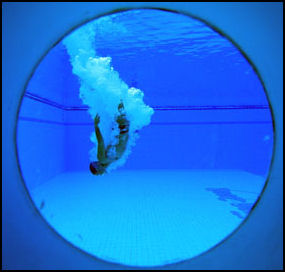
At the 2004 Olympics in Athens the Chinese won six of the eight gold medals and nine total medals in diving. At the 2000 Summer Olympics in Sydney, they won five of the eight gold medals and five of eight silver medals in diving.
Chinese athletes, especially women, have dominated Olympic diving since the 1980s, winning 29 medals, more than half of them gold, in the 1988, 1992, 1996, 2000 and 2004 Olympics. Chinese women first made a big impression at the 1984 Olympics in Los Angles when they executed difficult dives and entered the water without hardly any splash.
On Chinese training methods U.S. diving coach Ron O'Brien told Time, "the first three years the Chinese work on nothing but fundamentals of movement, with lots of dry-land repetition, and only then do the kids start to dive. In the U.S. our athletes attempt difficult moves before they are ready...The Chinese live poor and train rich."
A professional diving league has been established in China. Foreign divers have been invited to take part.
Chinese divers often bow to the pool after a dive to show it respect.
China has won more Olympic gold medals in diving (27) than any other sport.
In recent years Australian divers have given the Chinese a run for their money. One reason why is that they have hired Chinese coaches. Chantell Newbery, who won a gold medal for Australia in Athens in 2004, told the New York Times, “If it weren’t for them, we wouldn’t be here today. They have a tough program. But there hasn’t been too much complaining about it. We owe absolutely everything to them.”
See Articles Under OLYMPICS factsanddetails.com ; Chinese Olympic Committee en.olympic.cn ; China’s Olympic History china.org.cn ; Book: “Olympic Dreams: China and Sports, 1895-2008" by Xu Gouqi
Diving
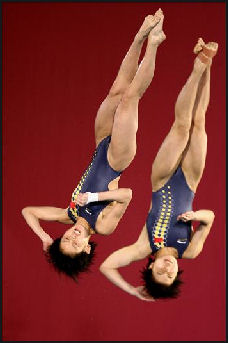 Platform divers take about three second to do their dives and enter the water at 35mph. A belly flop at that speed can be quite painful. To avoid this from happening divers fix their eyes on the same spot in the water on very rotation so they can keep track of where they are. They are also careful to leap far enough out from the platform or diving board so they don’t hit their heads. Some also assume a pike position underwater to stay shallow in the six meter deep pool and avoid hitting the bottom.
Platform divers take about three second to do their dives and enter the water at 35mph. A belly flop at that speed can be quite painful. To avoid this from happening divers fix their eyes on the same spot in the water on very rotation so they can keep track of where they are. They are also careful to leap far enough out from the platform or diving board so they don’t hit their heads. Some also assume a pike position underwater to stay shallow in the six meter deep pool and avoid hitting the bottom.
To create a perfect splashless dive the divers locate the water as they are finishing their moves and time their entry so their body is vertical. A splashless dive is achieved by entering the water with their fingers joined and pulling their hands apart when the hit the water, creating a hole in the surface for their body to slide through. This is called “ripping the entry” because a perfect entry sounds like “paper being torn apart.”
One thing that caught many observers’s attention at the Beijing Olympics was the large number of showers that the divers took between dives. The reasons the divers do this is that pool water is 79 degrees F and the divers have long waits between dives and need to stay warm and loose. One diver told the New York Times, “The showers are very hot, and it keeps your body warm. You want to be able to keep your body temperature very high, so you muscles are ready to go.” Another said, “It becomes a habit. You run into the shower to keep your muscles warm.”
Another ritual that the divers perform is drying off their bodies with shammies just before they dive, The reason for this is that divers have to be absolutely dry when they dive lest they loose their grip and slip, something that can cause them to totally blow a dive and land on their back. Some divers have used the same shammies for years.
Diving Rules
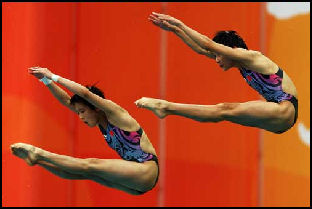
Wang Xin and Chen Ruolin in 2008 Divers are given a score based on the difficulty of their dive multiplied by the execution of the dive. The difficulty is generally based on how many twists and somersault they do and whether they do the dive in the tuck, pike or layout position and whether the dive is a front, backward, inward (facing backward and diving forward), or reverse (facing forward and diving backward) dive, or from a handstand. Execution is based on the height of the dive, the look and execution of the twists and somersault, how pointed the toes are and, often most importantly, their entry into the water, with a near vertical position and little or no plash being the ideal.
On both the platform and springboard divers perform one dive from each of the five categories: front, back, inward, reverse and handstand. Men do a sixth bonus dive. Divers are required to submit their routine to the seven judges 24 hours in advance of the event.
In synchronized diving two divers take off simultaneously from a single platform or two separate springboards, and perform five identical dives per round. Synchronicity is of utmost importance. Even if a dive is botched, if both divers botch it simultaneously, the team will not be hurt that much.
Divers have to score high enough in qualifications to move on to the semifinals and onto the finals. Divers typically play it safe during the semifinals, saving their hardest routines for the finals.
Fu Mingxia
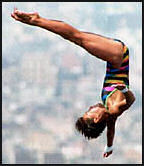
Fu Mingxia
at Barcelona in 1992
Fu Mingxia was one of the first super stars of Chinese sport. She has won four Olympic gold medals in diving. The only other divers who have equaled that feat are Americans Greg Louganis and Pat MacCormick. Fu started diving at seven and won the world platform championship in Perth in 1991 at the age of the age 12 years and 141 days, making her the youngest world title holder ever.
The daughter of a factory worker and accountant from Wuhan, Fu studied at the Beijing Sports School, where she attended classes and trained seven hours a day, six days a week, often doing 1,000 diving exercises each day, many with her head so close to the platform her short hair brushed the concrete.
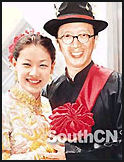
Fu Mingxia and
Anthony Leung
Fu entered the Beijing Sports School when she was nine. She told Time magazine that she cried out of homesickness for the first few months but found the training session emptied her of her emotions. "We don't have much time for other activities," she said, which for her were "listening to music, watching television and getting massages." She saw her parents only once a year and often was not allowed to see them when they attended her diving meets.
After the 2000 Olympics, Fu married Antony Leung, the third highest ranking official in Hong Kong. They were secretly married and Fu gave birth to child not long afterwards. Fu is sometimes seen in Hong Kong wearing sunglasses indoors and hanging out with Mandarin-speaking friends at the upscale Pacific Palace Mall.
Fu Mingxia in the Olympics
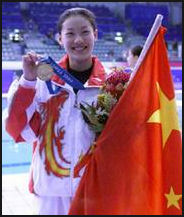
Fu was the youngest gold medalist at the 1992 Summer Olympics in Barcelona. Only 13 years old, five feet tall and weighing 93 pounds, she won a gold medal in the 10-meter platform event. After the 1992 Olympics, international diving rules were changed, banning divers under the age of 13 so they wouldn't injure their young bodies hitting the water at 35mph.
Two-inches taller and 13 pounds heavier, but still sporting the short mop-style haircut she wore in Barcelona, Fu won gold medals in the 10-meter platform and the 3-meter springboard at the 1996 Summer Olympics in Atlanta at the age of 17. Despite her successes, Fu only earned a $120-a-month state salary.
After the 1996 games, citing mental exhaustion, Fu retired and put on weight. At the time she said, "I feel very relieved. China will be proud of my progress.” On her achievements she said, "It's like climbing a hill. When you reach the top, there's no way to go other than down."
After studying economics and management science at Beijing's prestigious Qingua University for three years Fu decided to return her 10-hour-a-day training regimen and try out of the 2000 Olympics in Sydney. This time she dove because she wanted to and found the sport to be much more fun.
Fu was still only 22 when she entered her third Olympics. She won a gold medal in the springboard event and was rewarded this time with a $60,000 bonus from the government. Her biggest challenger was 19-year-old team mate Guo Jingjing, who led most of the competition. The two competed together in the synchronized springboard event and won a silver medal.
Guo Jingjing
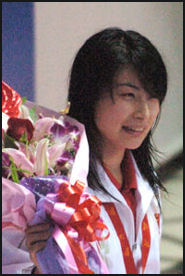
Guo Jingjing Before the Beijing Olympics Guo Jingjing won two silver medals at the Sydney Olympics in 2000, two gold medals at the Athens Olympics in 2004 and four world championships (2001, 2003, 2005 and 2007) in the 3 meter springboard and 3 meter synchronized diving events. At the world championships in March 2007, she beat teammate Wu Minxia in convincing fashion and won the synchronized event with Wu, finishing 37 points ahead of the runner-ups.
Guo is pretty and has nice body. Her face has been seen by millions on billboards and on television. Her activities outside the pool are watched as closely as her activities in it and she is a regular in Chinese gossip columns. At the 2004 Games she dated fellow diver Tian Liang. Since then she has been linked with Kenneth Fok Kai-kong the grandson of a Hong Kong billionaire and a well-known playboy, as well as to popular Canadian-Chinese singer Edison Chen. In 2008, a rumor was widely circulated that she was pregnant and would not be able to compete in the Olympics. Before the Olympics in Beijing she said she was going to retire.
One fan from Shanghai told the New York Times, “I think Guo Jingjing is the best. She’s excellent in diving, and meanwhile she’s a pop star, too. I can see her news both in the sports section and the entertainment section of the newspaper.”
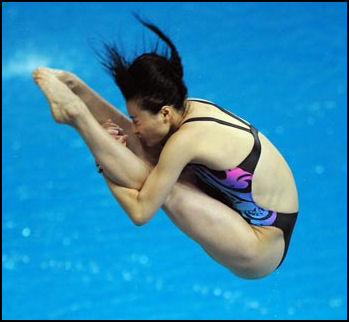
Guo Jingjing Guo is regarded as the best springboard diver ever. Born in Baoding, she began diving when she was six and displayed exceptional grace and spatial wareness early. She made her Olympic debut in Atlanta in 1996 at the age of 14, finishing 10th on the ten-meter platform. After that she concentrated on the springboard. Her powerful legs allow her to jump higher off the board than her competitors, impressing the judges and giving her more time to execute her dives.
Guo is considered the most successful female athlete in China. She has endorsement deals with McDonald’s, Coca-Cola and Toshiba. After Athens she devoted so much time to product endorsements and fashion shows and was sharply criticized for that. She also was criticized for being standoffish to reporters and speaking off the cuff. Once her coach had to apologize on her behalf when to called a Canadian diver “a fatty.” He coach said, “Guo Jingjing is like a child. She can’t express herself perfectly. For a while she was barred from the national team for being too commercial and had to make a public pledge to devote herself to diving to be let back on the team.
When it became clear that she wasn’t retiring and she wasn’t pregnant there were doubts that she would perform well in Beijing. In May she didn’t make the final at one diving event.
Tian Liang, Guo Jing Jing and Divers at the 2004 Summer Olympics in Athens
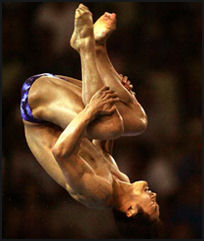
Tian Liang
Chinese divers won a record six gold medals at the 2004 Summer Olympics in Athens. Hu Jia and Tian Liang won the gold and bronze medals in 10-meter platform diving. Tian led most of the event, with Hu and an Australian overtaking him on the last dive. Tian and Hu won the gold and silver respectively in platform diving at Sydney in 2000 and together won the silver medal in synchronized platform diving in Athens. Tian and Yang Jinghui won the gold medal in the men's synchronized 10-meter platform event.
Lao Lishi and Li Ting won a gold medal in the women’s synchronized 10-meter platform diving event. The two 17-year-olds competed in matching suits and identical haircuts. A Washington Post writer wrote they “looked like two halves of a Rorschach print.” Lao said afterwards, “We were not nervous at all because we had a lot of practice on our physical and mental state.”
Tian is sometimes called the “Diving Prince.” He won two Olympic golds and the world championship and once scored 101.52 on a single dive, the highest ever in Olympics history. Tian began his diving career at age 7 when a coach noticed he was a much better jumper than his other classmates. Tian also competed in the 1996 Olympics. After Athens he asked for six months off, citing exhaustion, and then showed up in Hong Kong with an agent, lucrative endorsement deals and a multi-million dollar movie contract. He was then thrown off the team for “indulging in a series of commercial activities” without permission. He told Sports Illustrated, “I felt like I should commit suicide.” The last time anyone checked, he planned to open a diving school, enroll in graduate school and made money endorsing Olympic merchandise.
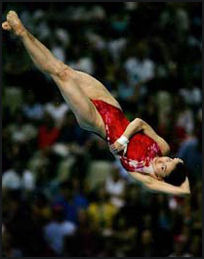
Guo Jing Jing
Guo Jing Jing and Wu Minxia won the gold medal in the women’s three-meter springboard synchronized diving event. Guo and Wu also respectively took the gold and silver medals in the women’s three-meter springboard diving. Guo’s victory marked the fifth straight time a Chinese woman had won that event. Guo was the world champion in 2001 and 2003 and won a silver medal in Sydney in 2000. In Athens she said, “I wasn’t nervous or stressed during the competition because I knew I could do well. I’m amazed about the gold medal. I have been training for this since I was five years old.”
As of 2007 Guo was a 10-time world and Olympic champion. She is the ex-girlfriend of Tian and is expected to be the biggest female star in Beijing in 2008. Like Tian she ran afoul with the Chinese sports authorities for trying to cash in on her fame, but was quick to make amends, submitting to self-criticism sessions and even publically apologizing on television and promised to share her earnings with the national diving team and sports administration. She now sports a diamond bracelet and Dior bag and has endprsement deals with McDonald’s. Coca-Cola, Li Ning and Chinese milk and food companies.
Other Chinese Divers
Fu's teammate, Tan Shuping, a world champion in the three-meter springboard, dropped from third to 25th in 1996 at Atlanta when did a belly flop on her last dive and received scores of 0.5, 0.5, 1.0, 0.5, 0.5, 0.5, 0.5 and 0.5.
Sun Shuwei received perfect 10s on seven of ten dives in the men's platform event at the 1992 Summer Olympics in Barcelona. Gao Min won the gold medal in the women’s three meter diving at the 1988 Olympics in Seoul. Since then Chinese women a gold medal in the event in every Olympics.
China's 22-year-old Xiong Ni won a gold medal in the men's three-meter springboard at the 1996 Summer Olympics in Atlanta. His team mate Yu Zhuocheng took the silver. Xoing won medals in three consecutive Olympics. At the 2000 Summer Olympics in Sydney, Xiong nailed his last dive and became the first man since Greg Louganis to win back-to-back gold medals in the springboard diving. Xiong, Louganis and Klaus Dibiasi of Italy are the only male divers men with five medals.
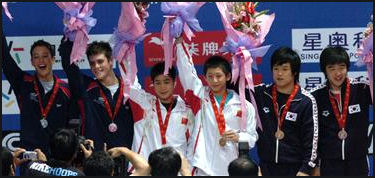
Chinese divers at 2006 World Championships
Gao Min was born in 1970. She won every international competition she entered, beginning in 1993, a record no other Chinese athlete in any sports has been able to equal. She was so dominant she often secured the title before even taking her last dive but complained that the pressure and expectations placed on her to win every time made her unhappy.
He Jia won a gold medal in Athens and was a favorite for Beijing until he was forced to retire at the age of 25 because a detached retina that was result of hitting the water head first up to six hours a day everyday. When informed of his injury he initially said, “I will do my utmost to grab” a gold medal “unless my eyes are really blind.” But finally said, “I kept hoping to the bitter end and finally had to see it was hopeless.” In Athens, he scored nine perfect 10s.
One study showed that 23 percent of Chinese divers suffer retina damage, probably as a result of their intense training and the repeated impact of water on their eyes.
Chinese Diving at the 2008 Beijing Olympics
China won seven of the eight gold medals in diving in Beijing in 2008, with only one Chinese diver not winning a medal. In Athens in 2004 China won six of eight events. No country had swept all the diving events since the United States did in 1952 when there were only four events. Synchronized diving was added in the 2000 Olympics in Sydney.
Large chanting, flag-waving Chinese crowds showed up for all the diving events. The cheers were reasonably loud for all the divers and were particularly load after the Chinese divers entered the water and again when their scores were posted.
Men’s Diving at the 2008 Beijing Olympics
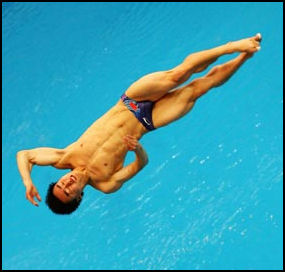
Qin Kai For a while it looked as the Chinese divers were going to win all eight medals but on the second to the last day of the Olympics Australian diver Mathew Mitcham toot the gold medal in the men’s 10-meter platform, just edging out Chinese diver and sliver medalist Zhou Luxin on the last dive. A Russian took the bronze Chinese diver Huo Lian took forth. It was the first time a Chinese diver placed lower than third ay Beijing.
Michtam’s success was a surprise to everyone, including Mitcham. Zhou and Huo were ahead on the platform in the early rounds. Mitchum didn’t even make the finals in the three-meter springboard, and finished 16th in that event, but he came through with a final very difficult dive — a backward 2½ somersaults, 2½ twists — that earn four tens while Zhou flubbed his final dive and only won 6s, 7s and 8s. Zhou, who led most of the competition, said afterwards, “I think I had a chance to get the gold. Maybe it was because I was too energetic to have a good performance after that first round.”
Lin Yue and Huo Liang won the men’s 10-meter platform synchronized event scoring 10s on several of their dives. Wang Feng and Qin Kai won the men’s three-meter springboard synchronized event in dominating fashion with 469.08 points, almost 20 points ahead of the silver medalist from Germany.
He Chong won the men’s three-meter springboard event in convincing fashion, earning 11 perfect 10s in the six-round final. Qin Kai won the bronze medal. Alexandre Despatie of Canada took the silver. He saved his most difficult dive — a forward 2½ somersaults with three twists — for last and earned a score of 100.70. On his opening dive in the finals, a forward 3½ in the pike position, he received perfect tens from seven of the 10 judges. His victory was the forth consecutive time that a Chinese diver had won the event. Qin Kai took the bronze
Women’s Diving at the 2008 Beijing Olympics
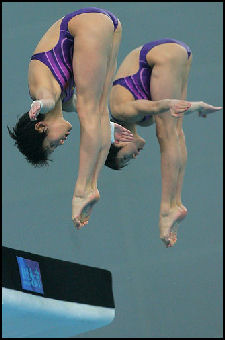
Wang Xin and Chen Ruolin Teenagers Wang Xin and Chen Ruolin won the gold medal in women’s 10-meter platform synchronized diving. It was the third straight Olympics that China had won the event. Chen was 15 and weighed only 66 pounds. Wang had just turned sixteen a few days before. She said, “The gold medal is the best birthday present I have ever had. I hope the luck can be with me all the time.”
In the individual women’s 10-meter platform event Chen Ruolin won the gold medal and Wang Xin won the bronze, with Canadian Emile Heymans taking the silver. There was doubts that the Chinese would win. Heymans was in first place with one dive to go.
Chen, who was ranked No.1 and was an reigning world champion, nailed her last and most difficult dive — a back 2½ somersaults, 1½ twists — barely making a splash when she entered the water and earning four 10s and three 9.5s. “When I entered the water, I had a feeling that I was going to win,” she said. She said she was a bit nervous because China had not won the event since 1997 and the gold meant that China had seven of seven diving gold medals up to that point.
Wang Xin was born Wang Ruoxue, She was first trained as a gymnast and then was seen as a promising diving prospect and switched to diving when she was 12. Her coach didn’t like her original name because “ruo” sound like the Chinese word for “weak” so she change into it “Xin”, which means “gold.”
Guo JingJing at the 2008 Beijing Olympics
Guo Jingjing became the most decorated female diver ever when she won her sixth career Olympics medal, a gold, in the three-meter springboard competition at Beijing in 2008. She her earned a total of 415.35 points to defend her title from four years earlier in Athens. Wu Minxia won the bronze medal. A Russian won the silver.
Guo and Wu earlier won the gold medal in the women’s three-meter springboard synchronized event, a title they also won in Athens in 2004 and the most recent world championship. After the synchronized event Guo said, “We weren’t relaxed as you think. Everyone thinks we only have to turn up to be champions, but we have put in a lot of work, we’ve put in a lot of sweat.”
Guo and Wu finished with a backward 2½ somersaults for a total of 343.50 points. Asked if she was ready to retire att the age of 26 Guo said, “I like the feeling when I stand on the springboard. I just can’t give it up...I haven’t thought of retirement yet because I love diving. If possible, I will continue diving.”
Image Sources: Beijing 2008 Olympics official website except Mao poster (Landsberger Posters http://www.iisg.nl/~landsberger/)
Text Sources: New York Times, Washington Post, Los Angeles Times, Times of London, National Geographic, The New Yorker, Time, Newsweek, Reuters, AP, Lonely Planet Guides, Compton’s Encyclopedia and various books and other publications.
Last updated October 2011
